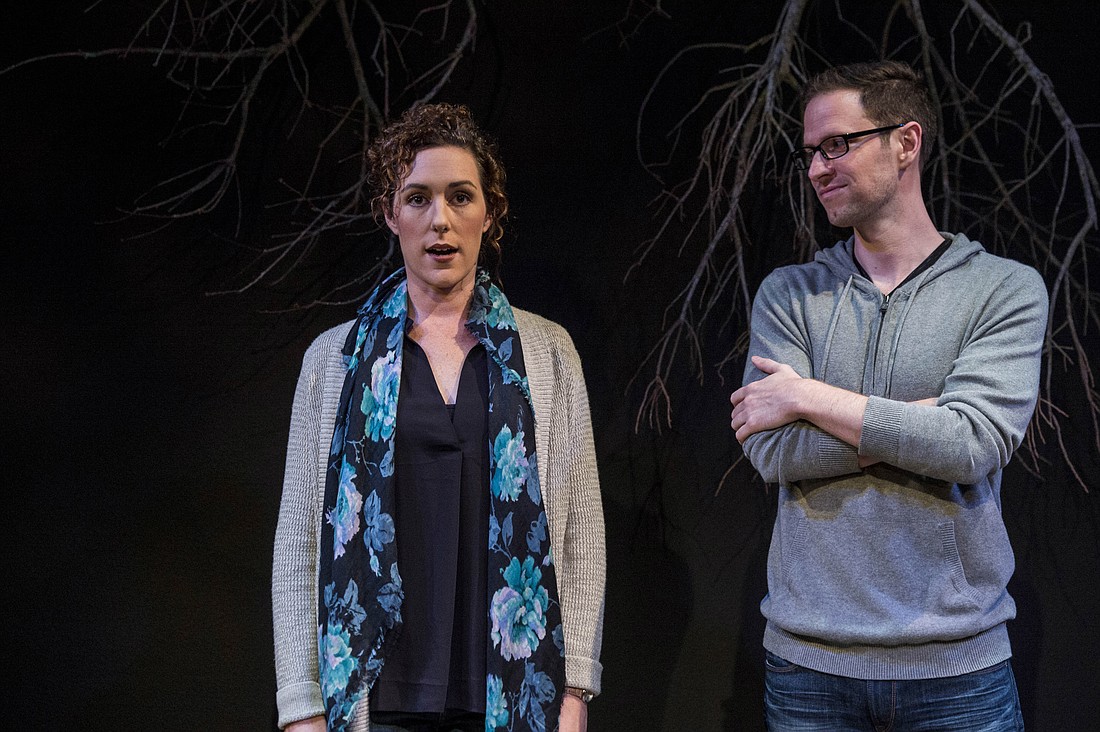- December 18, 2025
-
-
Loading

Loading

Duncan Macmillan’s “Lungs” is the latest offering at the Urbanite Theatre. It’s an old, old story. At the same time, it’s not.
The play revolves around the jabs, feints and sucker punches of a young couple listed simply as M (Brendan Ragan) and W (Katie Cunningham). She’s a bit of a nag and has a prosecuting attorney’s knack for inferring major character flaws in M’s casual choice of words. M simply keeps his head down and tries to keep her happy. The character dynamic between the two is as ancient as the first sit-com. But there’s a 21st century love triangle going on—as M discovers when he tentatively floats the idea of having a child. W rocks back on her heels and tells him she feels like she’s been punched in the face. Her other lover wouldn’t like it, you see. And that lover is Planet Earth. So what’s the problem?
Well, a child is a bundle of joy. But it’s also a bundle of environmental impact. That’s something to think about in a time of climate change and diminishing natural resources—and W has definitely been thinking.
She hits M with some of the un-fun facts on her mind: Did you know humanity has extruded half a trillion tons of carbon into the atmosphere since the Industrial Revolution? Did you know every infant generates a carbon footprint of 10,000 tons of CO2? W’s worries initially seem overblown. She comes off like a typical Jules Feiffer or Woody Allen neurotic—an over-intellectualized obsessive who thinks too much. Her concerns are played for laughs, at first. (And the audience was howling—particularly those in their 20s and 30s.) But about halfway through, the laughs stop coming. The play’s tone abruptly changes—and it’s just not funny anymore.
Long story short: W and M experience a series of setbacks, reversals and tragedies in a post-modern, off-and-on relationship, and then finally do have a child. Planet Earth is always in the background—and evidently not in good shape. The dialog is punctuated with throwaway hints about how hot it is, how weird the weather’s been, and how hard it is to breathe. The play moves faster and faster into the future in the live theater equivalent of a series of jump cuts. In the blink of an eye, W is old and grey, M is in the ground and the forests are gone. W knows her son is angry at her generation about something. But she can’t remember what.
Macmillan’s “minimalist” play is a different animal—a genetically modified beast that doesn’t fit the normal taxonomy of genre and tone. Not a typical play, folks. Or an easy one to produce.
The playwright’s manipulation of time echoes Beckett and Pinter. Director Daniel Kelly smoothly goes with the flow; he keeps your focus on the characters in their leaps across days, weeks and years. Macmillan’s whip-smart dialog reminds me of Mamet stripped of most of the curse words. “Oleana” in particular comes to mind. Such virtuosic verbal music demands adept verbal musicians. Cunningham and Ragan have the chops to pull it off. They individualize and humanize M and W—and make their dialectical tennis match seem like actual human speech. But, however well acted, the character study is a means to an end …
Behind all the clever words, there’s a message.
And I know that waves a red flag for many.
“If you want to send a message, try Western Union,” as Moss Hart famously said. A long list of authors, playwrights and screenwriters have ignored his advice, Macmillan is one of them. The message?
It’s as plain as the creepy, blasted tree (kudos to scenic designer Seth Graham) that forms the play’s only prop.
Once upon a time, Bob Dylan expressed the fear of bringing a child into a rotten world. Macmillan voices the fear that each child makes the world a little more rotten. Humans are killing the planet, to put it bluntly.
That’s the message. J’accuse, says the playwright.
And he’s pointing his finger right at you.
It’s a gripping night of theater, if you don’t mind the accusatory digit. For now, I’ll withhold judgment on Macmillan’s message. The facts aren’t in yet — and it could go either way …
If the eco-apocalypse doesn’t happen, 50 years from now this play will seem like a quaint comedy of manners about the tree-hugging, PC obsessions of the millennial generation. If humanity actually commits planetary ecocide, it’ll seem like a grim, prophetic indictment of us all.
Call me in 50 years and I’ll give you my verdict.
If either of us is still around.